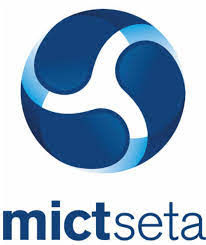Free Training & Career Tips... Subscribe to Get Weekly Career Tips

By Subscribing You are Agreeing to Terms and Conditions
MICT Seta stands for the Media Information and Communication Technologies Sector Education and Training Authority, otherwise known as MICT Seta. This particular Seta was established in terms of the Skills Development Act, 1998 (Act No. 97 of 1998) and is also a public entity. MICT Seta therefore fulfils an essential role within the sub-sectors it operates in achieving economic growth and skills development in South Africa. MICT Seta mainly operates in the following sub-sectors:
MICT Seta has a broad range of functions which this article seeks to address. The most critical of those being:
MICT Seta’s vision is in terms of seeking to be a global leader in the development and deployment of ground-breaking skills in the ICT (Information Communications Technology) arena.
MICT Seta’s mission is centred around providing opportunities for their stakeholders to actively participate in South Africa’s economy through skills development funding towards creating significant employment and fostering entrepreneurship, all with the aim to make South Africa an innovative and creative developmental nation.
MICT Seta is also involved in Sector Sills Planning (SSP) research that gives an overview of existing skills gaps within the scope of the MICT industry and details appropriate interventions targeted at addressing scarce and critical sector priority occupations. Presented annually as a document known as the SSP, this research is founded upon a broad triangulation process involving detailed consultation processes within the industry at large. The SSP therefore:
MICT Seta sees to it that only registered Skills Development Facilitators (SDFs) submit Workplace Skills Plans (WSPs) and Annual Training Plans (ATRs) or Pivotal Training Plans (PTRs) and Planned Training Reports (PTRs) in line with legislation and on their behalf.
The WSPs/ATRs as they are commonly known, reflect an employer’s training plan and cover the period from 1 April to 31 March of the following year and define what skills gaps and occupational shortages exist with the employer and those training programmes that need to be implemented by the employer over the period covered by the previous WSP. This information is important for MICT Seta as it forms part of the broader sector skills plan and information related to labour market supply.
Those Skills Development Facilitators who represent employers within the sector are able to provide MICT Seta with a letter presented on the company’s letterhead that confirms that the Skills Development Facilitator is summarily authorised to represent the said company regarding skills development issues and should submit these documents on their behalf. Prior to undertaking the role of Skills Development Facilitator the SDF is required to be both registered and accepted.
With respect to the submission and administration of the Workplace Skills Programs (WSPs) and Annual Training Reports (ATRs) as well as Planned Training Reports (PTRs) the Skills Development Facilitator will be trained in the capacity of being able to use the MICT Seta information management system. The SDF should also possess a sound understanding of and experience in matters related to the MICT Sector, Human Resources Development, Education and Training, strategies and business operations pertaining to their own organisations and the business environment in general and the macro economic environment at large to enable them to provide an effective service.
MICT Seta is involved in strategic planning which is aimed at providing a plan to address the skills development gaps and requirements of Government and the sector in which it operates. This planning outlines MICT Seta priorities, plans and programmes scoped out over a period of five years and is informed by Government strategic plans and policies as well as the Seta’s own SSP. Strategic development and implementation is approved by the Executive Authority which is the Department of Higher Education and Training (DHET) and is dependent upon available resources.
MICT Seta also grants bursaries to South Africans who wish to embark upon full-time study within one of the fields that fall within the reach of its sectors. Offered through partnerships with the National Student Financial Aid Scheme (NSFAS) and the majority of Technical Vocational Eduation and Training (TVET) universities and colleges, the bursary programme is aimed at providing support to financially challenged and deserving individuals seeking assistance.
In a nutshell, learnerships are work-based education and training programmes that are linked to a qualification that is registered on the National Qualifications Framework (NQF) and with the South African Qualifications Authority (SAQA). Essentially, learnerships comprise both practical workplace experience and structured theoretical programmes and are occupationally directed.
To the learner:
To the employer:
To the industry:
Through specialised training and structured exposure to the workplace, an internship is a type of programme that is structured to provide FET College and University graduates with opportunities to further their academic qualifications base. Those participating in internships are usually placed for a period of between 8 and 12 months on a full-time basis in Government organisations as well as stakeholder organisations. This ensures that the learner gains sufficient workplace experience in order to build upon their existing qualifications.
Internships are ideal solution for those who lack workplace experience and unlike learnerships, they are not regulated or strictly defined and can be flexible enough to afford graduates the opportunity to enhance their qualifications without too much red tape.
The MICT Seta accreditation process follows a strict process as outlined below. This is a general guideline obtained from the MICT Seta website and slightly amended for copyright purposes.
Criteria and guidelines / Code of conduct
A body can be accredited as a provider by an Education and Training Quality Assurance Body whose primary focus accords with the main focus of the provider, provided that the body who seeks accreditation –
(iii)review mechanisms that ensure that the quality management policies and procedures defined are applied and remain in place.
Those companies who are eligible to qualify for funding will be awarded with Mandatory Grants by MICT Seta. These grants are calculated at 20% of the employer’s 1% skills levy. To qualify, employers should submit a Workplace Skills Plan (WSP) and Annual Training Report (ATR) by 30 April each year in order to claim back the 20% as a mandatory grant. Those companies that have a wage bill of less than R500 000 are not required to pay this levy.
Employers who wish to qualify to receive mandatory grants from MICT Seta must meet the following criteria:
Discretionary grant funding is awarded to projects linked to scarce and critical skills and those that have been identified as sector priority occupations and with the purpose of being a platform to fund skills development. Discretionary grant funding has its focus on Professional, Vocational, Technical and Academic learning (PIVOTAL) programmes. Nevertheless, according to MICT Seta policy, grants may be awarded for PIVOTAL and non-PIVOTAL programmes alike. The grant submission period is advertised annually on the MICT Seta website.
While each Seta, including MICT Seta, facilitates the general recruitment and implementation of all learnerships, the onus is not on the Seta but falls to the employer, the training provider and the service provider to take responsibility for the recruitment of learners. Therefore, the processes and procedures involved for each participating entity must be followed and learners should via this process defer to their employers if they wish to apply to participate in a learnership.

MICT Seta deals with the following qualification programmes:
| Qual / Prog ID | Qualification Title/Learning Programme Title | NQF Level | Min Credits |
| LEVEL 2 | |||
| 78963 | Certificate: Telecommunications for Customer Premises Equipment | Level 2 | 120 |
| LEVEL 3 | |||
| 21799 | Certificate :Telecommunications for Customer Premises Equipment | Level 3 | 135 |
| 49077/ 61591 | National Certificate:Information Technology: End User Computing | Level 3 | 130 |
| 49077/ 61591 | National Certificate:Information Technology: End User Computing | Level 3 | 130 |
| 59569 | National Certificate: Electronics | Level 3 | 120 |
| 59910 | National Certificate:Information Technologies Operations | Level 3 | 130 |
| LEVEL 4 | |||
| 21190 | Further Education and Training Certificate:PC Engineering | Level 4 | 120 |
| 21191 | Further Education and Training Certificate: PC Support | Level 4 | 120 |
| 21797 | Certificate: Telecommunications for Customer Premises Equipment | Level 4 | 152 |
| 48811/67462 | Further Education and Training Certificate:Music Industry: Sound Technology | Level 4 | 159 |
| 49127 | Further Education and Training Certificate:Design Foundation | Level 4 | 141 |
| 49138/62610 | National Diploma: Copywriting | Level 5 | 240 |
| 50479 | Further Education and Training Certificate:Advertising | Level 4 | 148 |
| 59057 | Further Education and Training Certificate:Telecommunication Network Operations | Level 4 | 132 |
| 61450 | Further Education and Training Certificate:Film and Television Production Operations | Level 4 | 157 |
| 63849 | Further Education and Training Certificate:Electronics | Level 4 | 122 |
| 63849/80306 | Further Education and Training Certificate:Electronics | Level 4 | 122 |
| 61450 | Further Education and Training Certificate: Film and Television Production Operations | Level 4 | 157 |
| 65874 | Further Education and Training Certificate:Telecommunication Systems | Level 4 | 132 |
| 71853 | Further Education and Training Certificate:End User Computing | Level 4 | 132 |
| 73298 | Further Education and Training Certificate:Photography | Level 4 | 128 |
| 73390 | Further Education and Training Certificate:Graphic Web Design and Multimedia | Level 4 | 136 |
| 73391 | Further Education and Training Certificate:Website Development | Level 4 | 136 |
| 73429 | Further Education and Training Certificate:Computer Programming | Level 4 | 136 |
| 78964 | Further Education and Training Certificate:Information Technology: Technical Support | Level 4 | 165 |
| 78965 | Further Education and Training Certificate:Information Technology: Systems Development | Level 4 | 165 |
| LEVEL 5 | |||
| 22711 | National Certificate: Computer Science | Level 5 | 120 |
| 48573 | National Certificate: Information Technology: Systems Support | Level 5 | 147 |
| 48671 | National Certificate:Music Industry: Sound Technology | Level 5 | 139 |
| 48792 | Certificate: Broadcast Engineering | Level 5 | 120 |
| 48872 | National Certificate: Information Technology (Systems Development) | Level 5 | 131 |
| 49121 | National Certificate: Interactive Media | Level 5 | 130 |
| 49122 | National Certificate: Radio Station Management | Level 5 | 157 |
| strong>49138 | National Diploma: Copywriting | Level 5 | 240 |
| 57607 | National Certificate: 3D Animation and Visual Effects | Level 5 | 149 |
| 57611 | National Certificate: 2D Animation | Level 5 | 136 |
| 58394 | National Certificate: Film and Television Production | Level 5 | 122 |
| 58820 | National Certificate: Advertising | Level 5 | 124 |
| 58978 | National Certificate: Journalism | Level 5 | 120 |
| 60509/90721 | Certificate:Design Techniques | Level 5 | 121 |
| 62069 | National Certificate: Radio Production | Level 5 | 159 |
| 63769 | National Certificate: Business Analysis Support Practice | Level 5 | 138 |
| 65876 | Certificate:Telecommunications Systems | Level 5 | 120 |
| 83026 | National Certificate:Information and Communication Technology (ICT) Software Testing | Level 5 | 138 |
| 83446 | National Certificate:Electronics | Level 5 | 135 |
| LEVEL 6 | |||
| 63909 | National Certificate:Business Analysis | Level 6 | 149 |
| 71850 | Certificate: Technology: Database Development | Level 6 | 120 |
| 71869 | Certificate:Information Technology: Database Administration | Level 6 | 120 |
| LEVEL 7 | |||
| 49317 | National Certificate: Scriptwriting | Level 7 | 147 |
Copyright text 2024 by Business Optimization Training Institute.